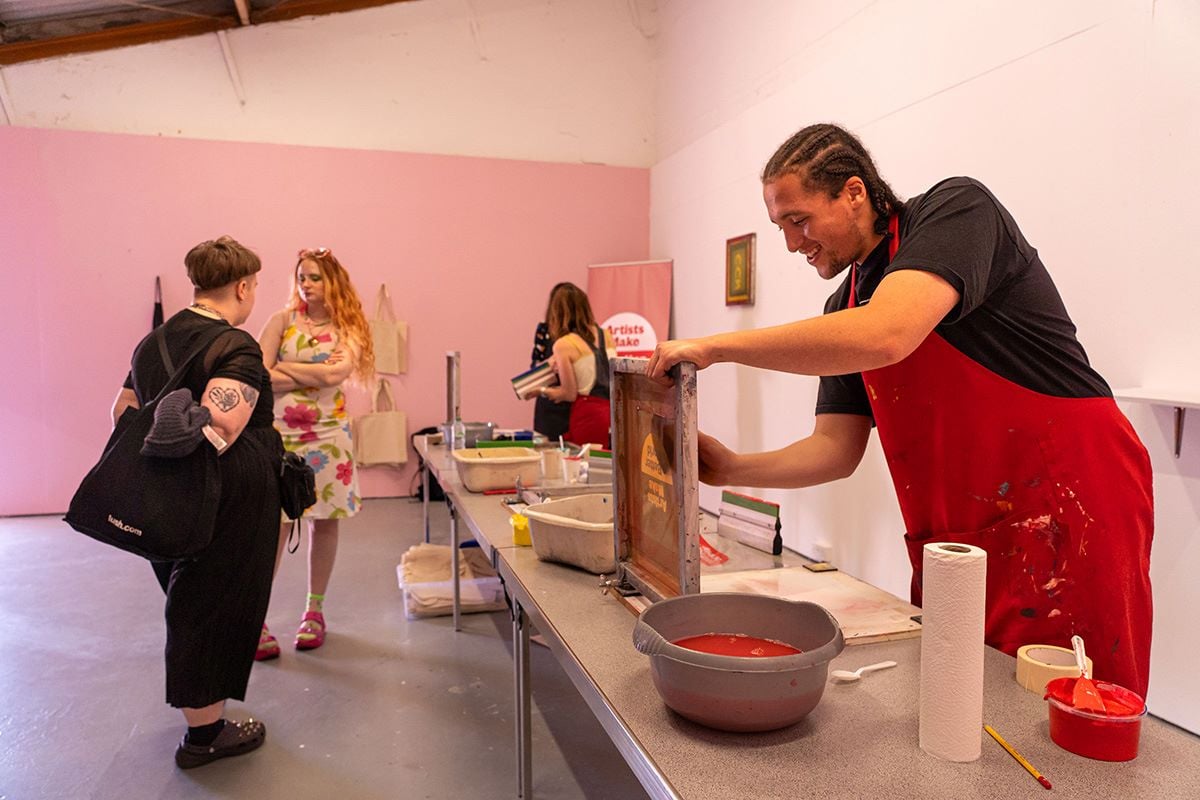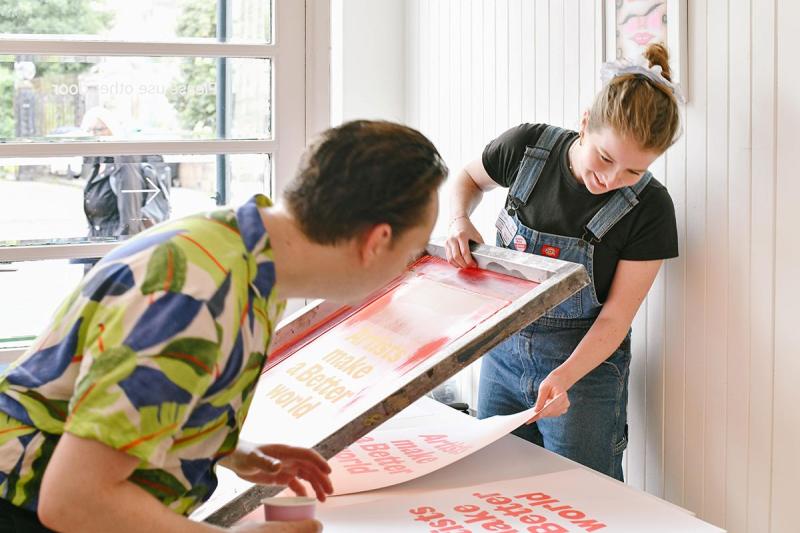
Scottish Contemporary Art Network members preparing for their campaign
Scottish artists making a better world
Artist activists in Scotland are arming themselves – with squeegees – in a battle to change the hearts and minds of their politicians, as Moira Jeffrey reports.
At the Scottish Contemporary Art Network (SCAN), we are planning some political advocacy and have written the prep list. It’s not campaign collateral sharing our key messages about why politicians should invest in culture for the good of their communities. No, our tools include a hairdryer, a squeegee and other paraphernalia needed for screen-printing.
SCAN’s campaign is Artists Make a Better World. As the member-led network for contemporary art in Scotland, when we are not giving evidence in the Scottish Parliament or supporting members to prepare for the most bruising public funding for over a decade, we are telling the story of how artists, art workers and art organisations improve our everyday lives, boost our economy and strengthen our communities.
But there’s a catch for those who join our campaign, which invites politicians to meet the cultural workers in their constituencies. On the grounds of both sustainability and our strong belief in the simple magic of art making, we ask you to print your own poster.
Building policymakers’ confidence
Since 2019, SCAN has been building Scottish policymakers’ confidence in understanding what artists and arts organisations do. And to help artists understand why, at times, our political representatives might be so afraid or so out of step with the public.
We know there are more museum and gallery attendances each year than the entire gate of premiership football in Scotland. And in Glasgow, half of visitors to the Art Fund Museum of the Year, the recently refurbished Burrell Collection, are from the city’s poorest areas. But political engagement for the cultural sector can be hard.
We’ve learned to ask members of the Scottish Parliament (MSPs) what the most pressing problems on their desks are. The answers: constituents experiencing mortgage or consumer debt and problems with access to transport or food on the table.
We want to share the message that our galleries are free to access. That our Edinburgh Sculpture Workshop, for example, works with people at risk of homelessness. Or that Impact Arts works on employability and tenancy sustainment. And that artists at Art Link Edinburgh make transformative art with adults who have severe and complex multiple disabilities; and their artists create projects that improve staff retention in one of the most hard-pressed services in Scotland’s NHS.
Magic occasions
In a bid to bridge the gap, I used to tell arts organisations that politicians are terrified by the possibility that a constituent or a news organisation might condemn them for spending a night at the opera.
I was never sure I believed that, but it was a useful way to explain the constant need of male politicians of a certain generation to mention football every time we talked to them about art. And then in July 2022, Angela Rayner was derided by Dominic Raab for going to Glyndebourne, and it turned out to be true.
But there have been magic occasions in our political engagement: the backbench MSP, now a minister, who spent a joyful evening crafting her self-portrait head in clay and talking about mental health and the challenge of moving cities to work. The senior parliamentary figure pulling a wobbly print in his local workshop in Orkney.
In 2019 we worked with a group from Fruitmarket Gallery’s Fresh Fruit project who were re-enacting one of contemporary artist Jacqueline Donachie’s early performance works Advice Bar. Jackie first made this performance in 1995 in an uber cool New York milieu where she dispensed drinks and wisdom to the city’s hippest. Now young adults were telling Scotland’s politicians how to solve their problems in their own parliament building.
 Preparing for the campaign: Artists Make a Better World
Preparing for the campaign: Artists Make a Better World
Does this get us where we need to be?
It’s been a brutal season in cultural politics in Scotland, on the back of a decade’s standstill funding and the Covid crisis. In December, in a body blow, the Scottish government announced a 10% cut in grant-in-aid to Creative Scotland, our principal public funder.
After a huge public campaign, the government announced in February that the cut had been reversed. This autumn it has been re-instated. It has been a reversal of a reversal that is leaving us reeling. The mismatch between government rhetoric and reality is ever more striking in a country that now measures 34th out of 38 countries in Europe for percentage cultural spend.
And if money is the main thing, there is no excuse for the strategic vacuum in Scotland where around half our core infrastructure is on a knife edge, yet a gallery building can add £120m to a city economy, or a cultural project to build confidence can change the life chances of a teenager seeking work.
And so, we persist. We’ll get the printing kit out and head to Ayr where Rachael Maclean has an offsite project led by Jupiter Artland. The artist has turned some of the endless empty shops in our high streets into a fantasy world where local schools and community groups will work on creative projects.
It’s only one of our many advocacy tools, but Artists do Make a Better World. We’re sure of it. A heady moment of artistic achievement should make even the hardest politico pause for thought. And in that moment of creation and self-worth we hope to break down the barriers.
Moira Jeffrey is Director of SCAN.
![]() sca-net.org
sca-net.org
Join the Discussion
You must be logged in to post a comment.